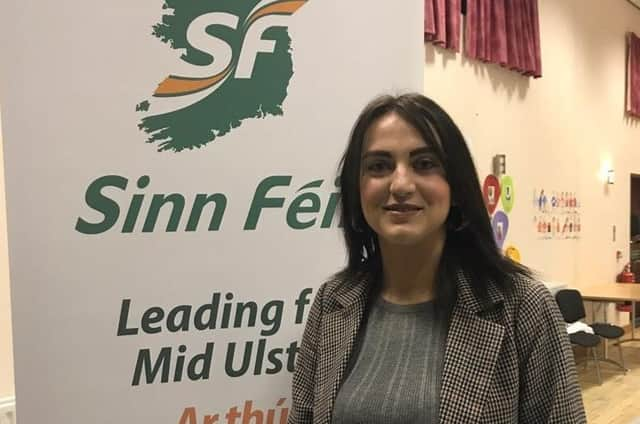Sinn Fein believes groundwork laid for a future bill of rights for NI citizens


Emma Sheerin made the comments today in a statement marking the release of a massive new report into a much-talked-about “bill of rights”.
A seven-MLA committee had been convened two years ago to consider the matter.
Advertisement
Hide AdAdvertisement
Hide AdAnd while its report contains no clear next steps (largely due to disagreement from the DUP), its chairwoman Ms Sheerin said “[we] trust that our detailed and thorough consultation, research and report will help and assist future work and negotiations”.
The report sets out the positions of the main parties on the subject.
The DUP “remains unconvinced by proposals for a Bill of Rights for Northern Ireland”.
This is because “we hold grave concerns regarding the implications of any course of action which establishes separate human rights legislation that is distinct from other parts of the UK”.
Advertisement
Hide AdAdvertisement
Hide AdHowever, the report indicates that at some point the DUP had supported the idea, but then did a U-turn.
It says: “On 3 June 2021, [the committee] agreed that it supported the creation of a bill of rights in principle...
“However, subsequently, the DUP in its position paper expressed disagreement with this decision”.
Sinn Fein’s stance meanwhile is to advocate for “a comprehensive Bill of Rights, drawing on international human rights instruments... [to] address the rights deficit that exists in the North of Ireland, which has been exacerbated by Brexit”.
Advertisement
Hide AdAdvertisement
Hide AdThe other Sinn Fein MLA on the committee besides Ms Sheerin is former IRA bomber Caral Ni Chuilin.
The remaining committee members are Paul Frew and Christopher Stalford (DUP), Alan Chambers (UUP), Mark H Durkan (SDLP), and Paula Bradshaw (Alliance, and committee deputy chairwoman).
Their report also gives an in-depth flavour of the views of the dozens of witnesses who were invited to give evidence, ranging from Irish language advocates and ethnic representatives to members of the judiciary.
It also uses the word “conflict” throughout in reference to the Troubles; the term “paramilitary” appears once, and “terror” not at all.
THE LONG HISTORY OF ‘A BILL OF RIGHTS’:
Advertisement
Hide AdAdvertisement
Hide AdThe idea of a Bill of Rights for Northern Ireland dates back decades.
The activist group the Committee for the Administration of Justice produced a report in 2003 which quoted politicians from all five main parties talking about the subject.
The report purports to show that at various stages in their history, views have been voiced from within all five main parties which favour the concept of some kind of bill of rights.
But it also notes that thanks to the Good Friday Agreement, the debate “moved from a somewhat abstract one to a very concrete phase”.
Advertisement
Hide AdAdvertisement
Hide AdThe 1998 deal said that a new body, the Northern Ireland Human Rights Commission, “will be invited to consult and to advise on the scope for defining, in Westminster legislation, rights supplementary to those in the European Convention on Human Rights (ECHR), to reflect the particular circumstances of Northern Ireland”.
It indicates that all of this may feed into “a Bill of Rights for Northern Ireland”.
The ECHR dates back to the 1950s, and the UK is a signatory.
Arguably the most prominent part of the ECHR is Article 2: this guarantees the right to life and also imposes a duty on the state to investigate suspicious deaths.
Advertisement
Hide AdAdvertisement
Hide AdThis has often been invoked in recent years to justify new investigations into alleged Troubles crimes, by claiming the original RUC investigation did not meet “Article 2 standards”.
Fast forward to January 2020, and the New Decade, New Approach deal.
This vowed that a “committee will be established to consider the creation of a Bill of Rights that is faithful to the stated intention of the 1998 Agreement, in that it contains rights supplementary to those contained in the European Convention on Human Rights”.
This “will be assisted in its work by a panel of five experts appointed jointly by the First Minister and deputy First Minister” – but this panel was never actually appointed.
MORE FROM THIS REPORTER:
Advertisement
Hide AdAdvertisement
Hide AdClick here: Lawsuits against the state from people interned in Northern Ireland 50 years ago now number up to 400
Click here: Catholic / Protestant quotas now in force in 28 new housing estates – with 31 more to come
——— ———
A message from the Editor:
Thank you for reading this story on our website. While I have your attention, I also have an important request to make of you.
Advertisement
Hide AdAdvertisement
Hide AdWith the coronavirus lockdowns having had a major impact on many of our advertisers — and consequently the revenue we receive — we are more reliant than ever on you taking out a digital subscription.
Subscribe to newsletter.co.uk and enjoy unlimited access to the best Northern Ireland and UK news and information online and on our app. With a digital subscription, you can read more than 5 articles, see fewer ads, enjoy faster load times, and get access to exclusive newsletters and content.
Visit
now to sign up.
Our journalism costs money and we rely on advertising, print and digital revenues to help to support them. By supporting us, we are able to support you in providing trusted, fact-checked content for this website.
Ben Lowry, Editor